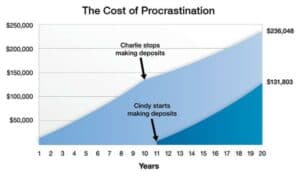Some of us share a common experience. You’re driving along when a police cruiser pulls up behind you with its lights flashing. You pull over, the officer gets out, and your heart drops.
“Are you aware the registration on your car has expired?”
You’ve experienced one of the costs of procrastination. Procrastination can cause missed deadlines, missed opportunities, and just plain missing out.”
Procrastination is avoiding a task that needs to be done—postponing until tomorrow what could be done today. Procrastinators can sabotage themselves. They often put obstacles in their own path. They may choose paths that hurt their performance.
Though Mark Twain famously quipped, “Never put off until tomorrow what you can do the day after tomorrow.” We know that procrastination can be detrimental, both in our personal and professional lives. Problems with procrastination in the business world have led to a sizable industry in books, articles, workshops, videos, and other products created to deal with the issue. There are a number of theories about why people procrastinate, but whatever the psychology behind it, procrastination may cost money—particularly when investments and financial decisions are put off.
As the illustration below shows, putting off investing may put off potential returns.
If you have been meaning to get around to addressing some part of your financial future, maybe it’s time to develop a strategy. Don’t let procrastination keep you from pursuing your financial goals.
Early Bird
Let’s look at the case of Cindy and Charlie, who each invest $100,000.
Charlie immediately begins depositing $10,000 a year in an account that earns a 6% rate of return. Then, after 10 years, he stops making deposits.
Cindy waits 10 years before getting started. She then starts to invest $10,000 a year for 10 years into an account that also earns a 6% rate of return.
Cindy and Charlie have both invested the same $100,000. However, Charlie’s balance is higher at the end of 20 years because his account has more time for the investment returns to compound.

Start Young
The earlier you start saving for retirement the better. It is very rare to hear someone state they feel over prepared for retirement. Albert Einstein once said, “Compound interest is the eighth wonder of the world.” As you can see above, the earlier you start, the longer you have compound interest working in your favor.
Be Consistent
Contributing to a 401(k) requires discipline, but it can yield a strong retirement nest egg if done with consistency. Even if you only start with $5 per paycheck, something is better than nothing. Plus, I doubt you will notice the difference on your paystub.
Don’t Forget to Plan
Antoine de Saint-Exupéry once said, “A goal without a plan is just a wish.” This rings true whether you are approaching retirement or just getting your first job. Planning for your financial future is key and doing so with a qualified professional is even more important.
If you have any questions about the health and strategy of your current plan, give us a call. Our team is dedicated to helping you achieve your financial goals and can provide personalized guidance to your unique needs and circumstances.
Have a great weekend!
Source: Ballentine Capital Advisors
Copyright (C) 2021. Ballentine Capital Advisors. All rights reserved.
Our mailing address is:
Ballentine Capital Advisors
15 Halton Green Way
Greenville, SC 29607
unsubscribe from this list update subscription preferences
Disclosure:
This is a hypothetical example of mathematical compounding. It’s used for comparison purposes only and is not intended to represent the past or future performance of any investment. Taxes and investment costs were not considered in this example. The results are not a guarantee of performance or specific investment advice. The rate of return on investments will vary over time, particularly for long-term investments. Investments that offer the potential for high returns also carry a high degree of risk. Actual returns will fluctuate. The type of strategies illustrated may not be suitable for everyone.
The content is developed from sources believed to be providing accurate information. The information in this material is not intended as tax or legal advice. It may not be used for the purpose of avoiding any federal tax penalties. Please consult legal or tax professionals for specific information regarding your individual situation. This material was developed and produced by FMG Suite to provide information on a topic that may be of interest. FMG Suite is not affiliated with the named broker-dealer, state- or SEC-registered investment advisory firm. The opinions expressed and material provided are for general information, and should not be considered a solicitation for the purchase or sale of any security. Copyright FMG Suite.
Ballentine Capital Advisors is a registered investment adviser. The advisory services of Ballentine Capital Advisors are not made available in any jurisdiction in which Ballentine Capital Advisors is not registered or is otherwise exempt from registration.
Please review Ballentine Capital Advisors Disclosure Brochure for a complete explanation of fees. Investing involves risks. Investments are not guaranteed and may lose value.
This material is prepared by Ballentine Capital Advisors for informational purposes only. It is not intended to serve as a substitute for personalized investment advice or as a recommendation or solicitation or any particular security, strategy, or investment product.
No representation is being made that any account will or is likely to achieve future profits or losses similar to those shown. You should not assume that investment decisions we make in the future will be profitable or equal the investment performance of the past. Past performance does not indicate future results.


